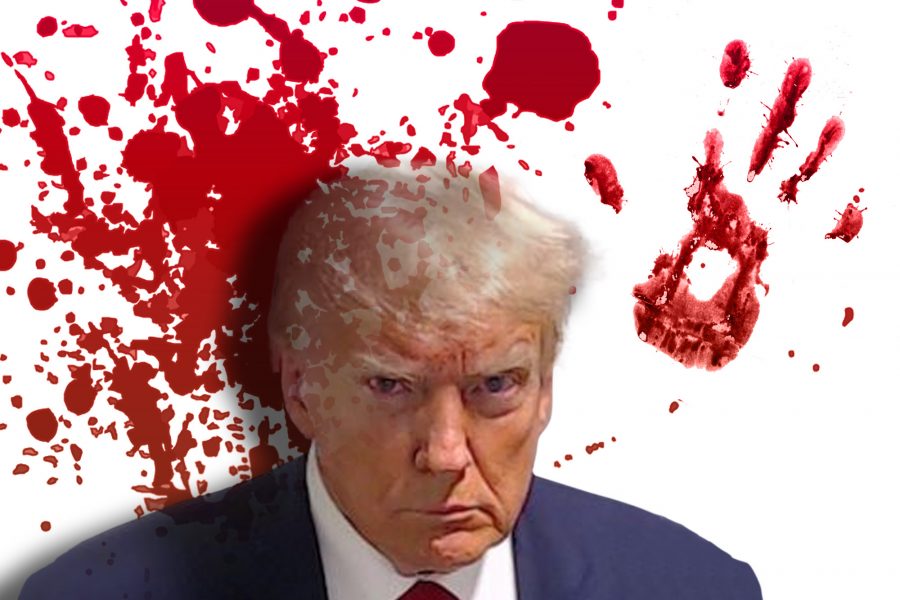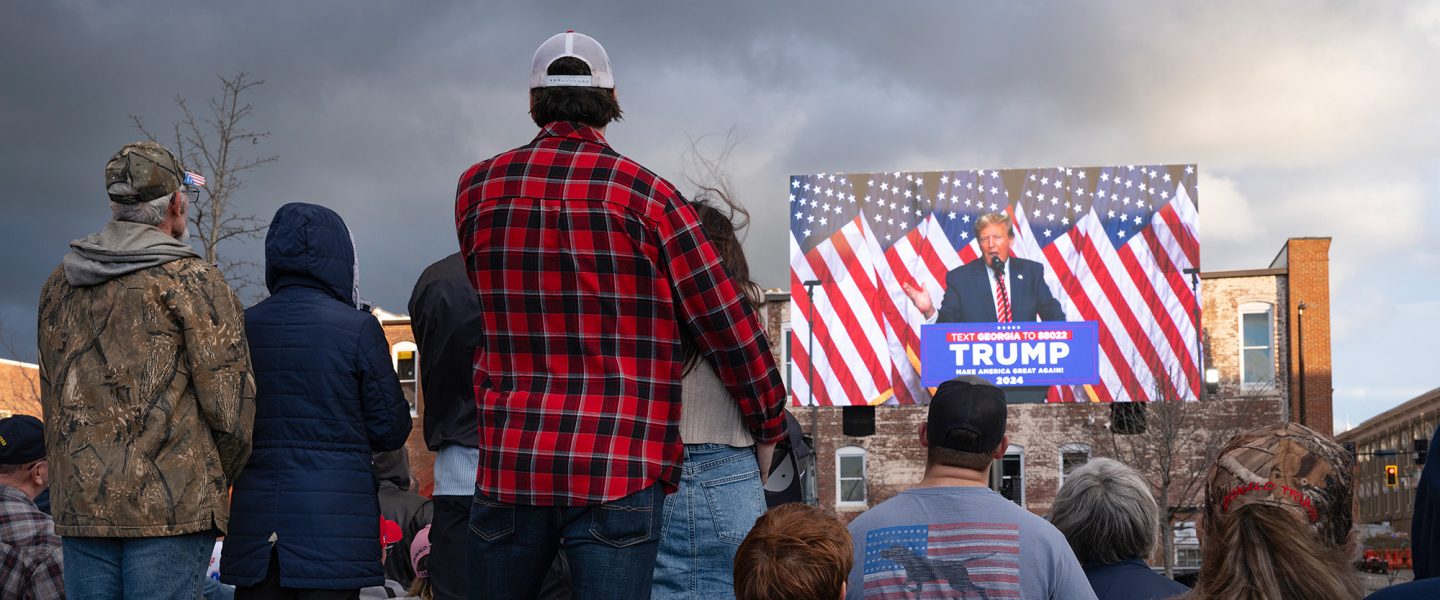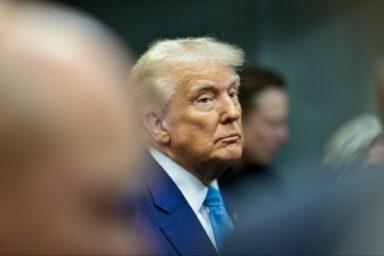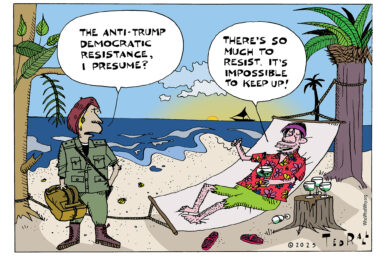It’s worse in context.
|
Listen To This Story
|
At a rally in Vandalia, OH, last Saturday, Donald Trump promised a “bloodbath for the country” if he’s not elected president. Then followed a predictable bout of (self-)deception: the claim that Trump’s bloodbath was out of context.
Well, everything does have contexts, including bloodbaths. So let’s put Trump’s in context.
The Vandalia rally began with a brazen celebration of the convicted criminals who took part in Trump’s failed coup attempt. Those present were instructed to “please rise for the horribly and unfairly treated January 6th hostages.” The reference was to convicts serving time for attempting to overturn the results of the last presidential election and thereby overthrow the American form of government.
The phrase “horribly and unfairly treated January 6th hostages,” booming over the loudspeaker, was substituted here for the call to rise for the flag or the national anthem. The people who tried to overthrow the Constitution were inserted where a pledge to American values would ordinarily be. Americans were being asked to honor violence in the service of overthrowing the American system.
This Gesamtkunstwerk [ed. note: complete work of art] was designed to bring people into a sense of unity with the perpetrators of the January 6 crimes. As a chorus of convicted criminals sang over video, people rose and then joined in song. They put their hands on their hearts. Along with the coup convicts, those who attended the rally performed a perforated version of the national anthem. In so doing, they joined a virtual community of violence.
The singing was interwoven with a recording of Trump reciting the pledge of allegiance, as though he were the only American who mattered. Baseball cap still on head, Trump saluted a recording of himself. Both of these details, too, are mockeries of patriotic performance. Trump has no right to salute at that moment. Not removing the cap means that he, and he alone, is above it all — the martyr in chief, the most “horribly and unfairly treated.”
After the blasphemous mashup was complete, Trump began his Vandalia speech with these words:
Well, thank you very much and you see the spirit from the hostages, and that’s what they are is hostages. They’ve been treated terribly and very unfairly and you know that and everybody knows that, and we’re going to be working on that sooner. The first day we get into office, we’re going to save our country and we’re going to work with the people to treat those unbelievable patriots, and they were unbelievable patriots and are. You see the spirit just cheering? They’re cheering while they’re doing that and they did that in prison and it’s a disgrace in my opinion.
So, right at the beginning, Americans at the rally are told to identify themselves with people who tried to overthrow an election by force, who are celebrated as “unbelievable patriots.” That is perhaps the most essential element of context to Trump’s later reference to a bloodbath.
He has already made clear, in the collective performance, that violent insurrection is the best form of politics. Well before he actually used the word, he had instructed his audience that bloodbaths are the right form of politics. (This is, by the way, not just the context of this rally, but of his rallies generally.)
Right at the beginning of his Vandalia speech, Trump referred to the convicts as “hostages” and promised to pardon them “the first day we get into office.” That pardon pledge is a second essential context for Trump’s later reference to a bloodbath.
Trump is saying that, as president, he will have the power to protect violent criminals who help him get into office. You can bring about a bloodbath with impunity: That is what his audience was told.
Trump already, in those first few sentences, was invoking a third important context: his lies about the outcome of the last presidential election, lies that began in November 2020 and continue until the present day.
There has been some wishful thinking about Trump and the big lie, a suggestion that he no longer depends upon it. Anyone following his rallies and his utterances knows this to be false. The whole business of “hostages” depends on the big lie, and in this sense the big lie was constantly invoked throughout the speech.
In Vandalia, Trump also told his big lie explicitly at least nine times:
“If the voting were real…”
“What a fake election that was.”
“Then we had a thing called the rigged election…”
“You fight a crooked election and they indict you.”
“…we got millions and millions more votes in 2020, but we couldn’t even talk about it.”
“He was an election denier, which is the right thing because the election was crooked.”
“We made it great. And then we had a bad election…”
“And anybody that can cheat on elections the way they do is not incompetent. Okay? I think they hate our country.”
“The radical left Democrats rigged the presidential election in 2020, and we’re not going to allow them to rig the presidential election in 2024. Not going to allow it to happen.”
The big lie, the identification with its violent servants, the promised pardon — these are three major contexts Trump himself insists we take seriously. He is summoning an insurrection by his alternative reality, his promise of impunity, and his martyrology.
The cult of criminals as martyrs also suggests a historical context: the fascist politics of violence. Before Hitler came to power, Joseph Goebbels worked hard to find a violent Nazi who could be portrayed as a victim of the far left. He eventually found a dubious character named Horst Wessel, who became the subject of the Nazis’ main song. Trump has made an eerily similar move, turning his coup criminals into musicians of martyrdom.
The fascist-style martyrdom cult justifies violence in two ways. It makes a hero of criminals, thereby making criminality exemplary. And it establishes prior innocence — we suffered first, and therefore anything we do to make others suffer will always be justified. The Nazis sang their Horst Wessel song as they conquered countries and killed millions.
Trump’s Vandalia speech also summoned up the fascist historical context in another way. For fascists, political opponents are enemies because they are animals or are associated with animals. The border theme in Trump’s campaign is meant to link the Biden administration to violent subhumans. In the Vandalia speech, Trump called migrants animals, snakes, and monsters. In this passage, he called them inhuman:
Young people, they’re in jail for years, if you call them people, I don’t know if you call them people. In some cases they’re not people in my opinion, but I’m not allowed to say that because the radical left says that’s a terrible thing to say. They say you have to vote against him because did you hear what he said about humanity? I’ve seen the humanity and these humanity [sic], these are bad. These are animals and we have to stop it.
By now we have taken into account some important contexts: how Trump himself introduced his speech; the politics and mendacity of his coup attempt of 2021; and the history of fascist violence generally. All of this confirms that when Trump threatens a bloodbath he means a bloodbath.
The bit of syntactic context that the defenders (and the wishful thinkers) have in mind is the subject that Trump was speaking about right before he spoke of bloodbath. He promised to place tariffs on cars made by Chinese companies. Here are Trump’s words, exactly as uttered, including what he said about cars:
China now is building a couple of massive plants where they’re going to build the cars in Mexico and think, they think that they’re going to sell those cars into the United States with no tax at the border.
Let me tell you something to China, if you’re listening, President Xi, and you and I are friends, but he understands the way I deal, those big monster car manufacturing plants that you’re building in Mexico right now, and you think you’re going to get that, you’re going to not hire Americans and you’re going to sell the cars to us.
Now, we’re going to put a 100 percent tariff on every single car that comes across the line, and you’re not going to be able to sell those cars, if I get elected.
Now, if I don’t get elected, it’s going to be a bloodbath for the whole — That’s going to be the least of it. It’s going to be a bloodbath for the country. That’ll be the least of it.

The people who say that the car context rescues Trump ignore the meaningful contexts: history, Trump’s own history, the opening of the rally, what he said in the speech generally. Focusing on the cars has the effect of casting away the fascist overture and rest of the speech, and all of the other contexts. Those who speciously insist that Trump had in mind an automotive bloodbath never mention that he had just celebrated criminals, repeated the big lie, dehumanized people, and followed fascist patterns.
In this sense, Trump’s defenders are the ones who are taking Trump’s remarks out of context.
And, in their more strident forms, the defenses of Trump are not innocent. The apologists suggest that Trump is being unfairly attacked — that he is, once again, as always, the real victim. That sort of claim reinforces the martyrdom narrative. Those who make it are partaking in the spirit of the rally.
The meaningful contexts make Trump’s summons to violence clearer and worse.
That said, even if we knew nothing about the history of political violence, or about Trump, or about the rest of his appearance in Vandalia, the meaning of “bloodbath for the country” would still be absolutely clear to anyone who listened to him. Even if we play the bad-faith syntactical game that his defenders want us to play, there is really no doubt that he was talking about a bloodbath when he spoke of a bloodbath.
Yes, Trump spoke for a moment about cars. He was saying that we should elect him so that he can put tariffs on Chinese cars. At this point he is presumably still on script. And then he starts to say that it will be bad for the auto industry if he is not elected.
But he never quite gets to that, since in the middle of the sentence he has another idea.
The auto industry, he says, is “the least of it.” If he is not elected, “it’s going to be a bloodbath for the whole” and “it’s going to be a bloodbath for the country.” He repeats that the auto industry is “the least of it.”
So, yes, the words about cars are part of the context, in the sense that if you pay attention to them you know that he does not mean an automotive bloodbath.
The auto industry is “the least of it.” Trump is promising, as he says, a “bloodbath for the country.”
Even in the narrow syntactical context chosen by his defenders, it is clear what Trump has said. And even more important are the physical context, the context of the speech as a whole, the historical context.
Trump is calling for a bloodbath in front of people who stood to honor bloodshed. People who have just sung with coup criminals. People whom he implicitly promises he will pardon if they carry out another insurrection. And he is doing this in the fascist style of telling a big lie that confers martyrdom upon criminals who try to overthrow a democracy they associated with subhumans.
Related:
We should see Trump for what he is: an aspiring fascist who likes, wants, and needs violence. But we need not fear him or his plans. There were not that many people assembled in Vandalia, and their reactions to Trump’s rhetoric were muted. Some left before he was done.
Although Trump himself has (absurdly) escaped punishment for his attempted coup, the foot soldiers of the last insurrection are in prison. Trump won’t actually be able to pardon anyone this fall.
In coaching his followers towards a November 2024 insurrection, Trump is telling them (and us) that he doesn’t really plan to win the election. As he did in 2016, as he did in 2020, he is telling us that the vote count does not decide the issue for him. He wants to get close enough in the tally to make some kind of a play. But the vote count will matter to the rest of us. If the election is not close, it will matter even to his followers.
The work to be done is to make sure that Trump doesn’t come close. And part of that work is to explain to voters what Trump says and who Trump is. He’s the bloodbath candidate.
Reprinted, with permission, from Tim Snyder’s substack, Thinking about….
Timothy Snyder, Richard C. Levin professor of history and professor of global affairs at Yale University, is an American historian of Europe and a public intellectual on both continents. Among his many books are On Tyranny and Bloodlands. His work inspires art and music, and is read at protests around the world.





